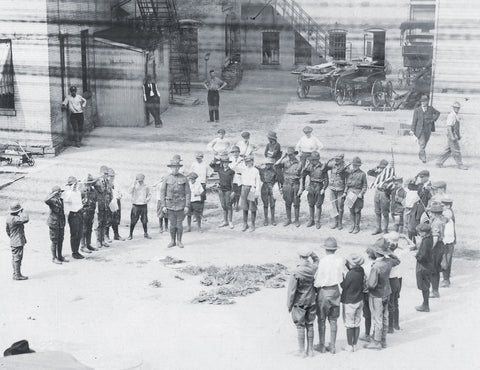
Boy Scout Burn
On June 10, 1918, a photographer from Ohio’s Cleveland Leader News captured this scene of a local Boy Scout troop burning stolen copies of the city’s oldest foreign language newspaper, Waechter und Anzeiger (Sentinel & Advertiser). Founded in 1852 by German immigrants, the Waechter und Anzieger had a proud history of serving the German-speaking community of Cleveland. The weekly had reached a record circulation of 34,000 by the eve of World War I.
Soon after the April 6, 1917, U.S. declaration of war against Germany, however, Americans across the country began to regard their neighbors of German ancestry with suspicion. Anti-German rhetoric in newspapers, magazines and even the nascent film industry all galvanized an image of “the Huns” as barbaric, scheming villains seeking to dominate Europe. The earlier revelation of the Zimmermann Telegram, in which Germany secretly proposed to ally with Mexico and help them reconquer the American southwest, brought the previously far-flung threat of the war close to home.
A quarter million German citizens living in the United States were required to register with their local post offices during the war, while more than 2,000 were detained in internment camps for the duration. It wasn’t just foreign- born Germans who were eyed with suspicion, though: German-American communities nationwide were targeted in the name of patriotism. Many schools banned German language lessons, federal authorities raided ethnically German businesses under the authority granted by the 1917 Espionage Act, and multiple states even considered speaking German in public a crime. President Woodrow Wilson and former President Theodore Roosevelt were among those who spoke out against any such perceived disloyalty, Wilson referring to German-Americans as “hyphenated Americans,” and Roosevelt saying in a speech, “America is a nation — not a polyglot boardinghouse.”
Despite the obstacles, many German-Americans served with pride and distinction throughout the war, including America’s most decorated fighter ace of the war, Eddie Rickenbacker. Born to German-speaking Swiss immigrants in Columbus, Ohio, Rickenbacker had to drop out of school to support his family at age 14 after his father’s death. By June 1918 Rickenbacker had scored six of his eventual 26 aerial victories — even as Boy Scouts in his home state burned his heritage while waving American flags.
historynet magazines
Our 9 best-selling history titles feature in-depth storytelling and iconic imagery to engage and inform on the people, the wars, and the events that shaped America and the world.
